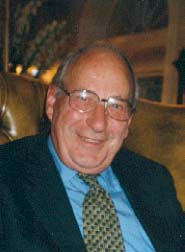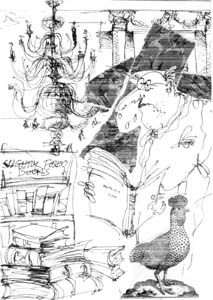Eric Morten Interview
I first met Eric Morten at the 2002 PBFA Edinburgh Festival Book Fair. He had just emerged from a power nap on the floor under a table, where he had been shielded from view by a green baize cloth. He was in loquacious good form, full of anecdotes and jokes. Although his family has a long book trade lineage, his childhood was impoverished. Eric was often left in charge of the stall in Shudehill market while his father and his Uncle George disappeared into the nearest pub ‘to sort the money out’. Every last penny his father made went on ‘drinking, gambling and fornicating.’ When he advised his son, ‘Don’t do as I do, do as I say,’ Eric took note, and concentrated his mind on making his first million.

What do you like best about being a bookseller?
I get excited about selling things. I am a salesman at heart. I enjoy making people comfortable about what they are buying. I got a taste for it early doors. I remember one time when I was working for my father, the van broke down and I had to get the cart, load it up with books, and push it down Mosley Street and up the High Street to the market. Going over the cobbled roads, books kept falling off, and every time I stopped to pick them up, someone wanted to buy something. I must have sold more books on the street than I sold in the market that day!
Even though you say your father gambled all his money away, you kept working with him till you were thirty years old.
Much as I loved him, it infuriated me that he never kept a good book long enough to find a private customer for it. He always sold cheap to the trade for the quick turnaround. When I started solo as a bookseller, I had eighteen pounds in my pocket and about thirty-five books. My first customer was Tom Crowe, a bookseller from Norwich. He came over and spent £36. That meant I now had £54 altogether. Another of my early customers sent me a note saying, ‘Dear Eric, please find enclosed a cheque for £5. I hope it is the first of many that you will receive in your life.’ I also got a note from a bookseller, saying, ‘You’ll never make it on your own in the antiquarian book world.’ Sadly, he wasn’t around to see me recently open a two-storey, 2400-square-foot bookshop in Didsbury.
 Left: a customer at the PBFA spring book fair, Assembly Rooms, George Street, Edinburgh. Drawing by Ron Wilson of The Old Town Bookshop, Victoria Street, Edinburgh.
Left: a customer at the PBFA spring book fair, Assembly Rooms, George Street, Edinburgh. Drawing by Ron Wilson of The Old Town Bookshop, Victoria Street, Edinburgh.
What was your first really good buy?
George Moore’s The Flowers of Passion, published by Provost & Co, London, 1878. I got it in a lot at Taylor’s auction rooms on Mosley Street. It’s Moore’s first book and it’s rare, though nothing much to look at. But I knew what it was when I saw it and went on to sell it for £120. Years later, at an auction in Southport where a great array of Victorian and Edwardian literature was being sold, I spotted another Flowers of Passion and I got that one too. No one else had noticed it. After the sale, one of the booksellers, Charlie Broadhurst, was boasting that he’d got all the George Moores. ‘Not all of them, you didn’t,’ I told him, and showed him my Flowers of Passionplain. He couldn’t bear to lose face, so he bought it off me there and then. I was delighted, I had pulled one over the scholar. I love auctions, the adrenaline about them. I am a numbers man, I know what went for what. Auctions frighten a lot of people because of their unpredictability. I cannot think of too many instances where I haven’t managed to get what I want, but there must have been a few. Usually I am able to shut these things out and move on. The thing is, I am a fighter. I’ve also bought very well privately, modern firsts, Victorian books, pamphlets, art books, early books. Sometimes real gems lie in attics, without anyone realising what they have there. Four years ago I was invited to a college and taken up to the attic, where no one had been for over fifty years. It was full of seventeenth-century Catholic literature. Another time, I was loading up the books I’d bought when the owner remarked, ‘You haven’t been in the attic, have you?’ There was a seventeenth-century library up there as well. One thing about being a numbers man means that when I look at libraries I’m able to keep a firm hold of the variables and never get confused. I like conjuring with figures.
What’s your own taste in reading?
The thing I enjoy, which might sound strange to you, and I keep almost as a secret, is bibliography. I have a photographic memory and I know it without doubt. That is the magician in me. My accumulated knowledge of bibliography is just there in my head, all stored up. I am able to use it as scholarship, as a trick.
How did you get into publishing local history?
I went into publishing because it was a shortcut to publicity and cheap advertising. Every book had to have my name on the spine, you see. What happened was, the local Civic Society asked Manchester University Press to publish a history of Didsbury, but they turned it down as being too parochial. Then the Civic Society came to me and I said, ‘I’ll do it, but you’ll have to give me £200 towards production.’ They agreed. I pre-sold it through a little brochure and on the night of the launch we sold out:500 copies in one day. I reprinted that book five times and went on to publish many other local histories. In 1972 I asked Manchester University Library to lend me their two-volume Dougdale’s Warwickshire, because I wanted to reprint it. The then librarian, Fred Radcliffe, said they only loaned their books to reputable London publishers. So I borrowed it from Birmingham University Library, and I went back and told Manchester that from that day I would never sell them another book. They wanted to know why not and I said, ‘Well, you see, I hope one day my son will follow me into publishing. I might have sold you an old book that he might want to reprint, and now I know your policy would be to deny him access to it. So I ain’t gonna sell it to you.’ Since that day, of course, they have made such amends that I would never think of withholding anything from them. We have become very, very friendly. As well as histories, I’ve also published a few bits of poetry – Seamus Heaney, among others – under the imprint of Phoenix Pamphlets Poets. I always made it part of the deal that each author had to sign copies and write a new poem for me.
What would your advice be to anyone going into bookselling?
 My advice would be, before you go into the business, spend £250 on elocution lessons. If you go about with a plum in your mouth, you’ll be listened to. I can get away with it because I’ve been around for a while and I’ve made it. The only thing that everyone can measure you by, categorically, is money. You will have one person measure you by clothes and money, another by your ability at golf and money. The money is always there. My father had nothing. We had nothing. I vowed that whatever I wanted, I would have. The only way for me to do that was to work like bloody hell.
My advice would be, before you go into the business, spend £250 on elocution lessons. If you go about with a plum in your mouth, you’ll be listened to. I can get away with it because I’ve been around for a while and I’ve made it. The only thing that everyone can measure you by, categorically, is money. You will have one person measure you by clothes and money, another by your ability at golf and money. The money is always there. My father had nothing. We had nothing. I vowed that whatever I wanted, I would have. The only way for me to do that was to work like bloody hell.
Copyright Jennie Renton 2005.

michael jones on Wed, 26th Jan 2011 8:32 am
Came upon this article by accident. The Tom Crowe referred to was my grandfather, Charles Crowe\’s, brother. Charles owned and ran the Wrexham, North Wales, \’branch\’ of the Crowe family book empire.
michael jones on Sat, 12th Mar 2011 8:22 am
Lynden Harvey on Mon, 2nd Sep 2013 4:07 pm
Your grandfather was my father, Thomas. Well remember Uncle Charles, and Aunty Nancy. I and my brothers still liv.e in Norwich
Michael Jones on Thu, 11th Sep 2014 6:50 pm
Lynden, Just spotted your contribution (over a year after you posted!) Charles was an excellent grandfather. When I was in junior school in Wrexham (St Giles) he’d sometimes and completely unexpectedly turn up at the school to take me out to a book sale at what he referred to as,’up the country’! He used to call me ‘Lad’ and hardly ever my given name. In, I think, 1995, I was in Norfolk on holiday with my wife and we visited Crowe’s Norwich book-shop. We spoke with Russell and he was surprised when I told him who I was and amazed when I informed him that Charles’ widow, Gwen, was still alive in Wrexham. (She went on to live on until June 2001, when she died at nearly 101!). Regards to you and please pass on my regards to the Norwich Crowe contingent if you see this. Michael (Jones).